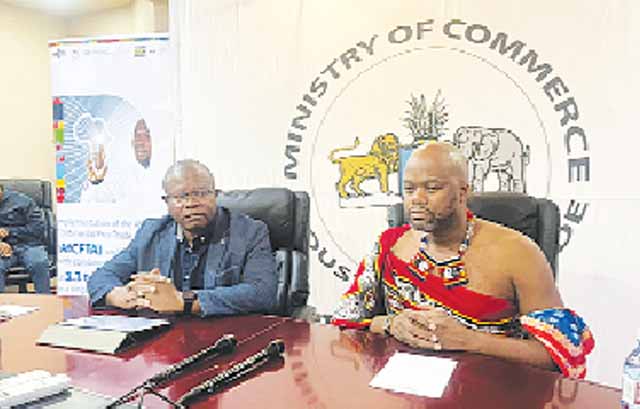By Nomfanelo Maziya | 2024-09-04

Eswatini's longstanding membership in the various regional integration arrangements has positioned the country well, to capitalise on opportunities presented by the African Continental Free Trade Area (AfCFTA).
Secretary General of AfCFTA Wamkele Mene yesterday urged Eswatini to leverage its existing regional market experience to capitalise on the opportunities presented by the continental free trade agreement further deeming the private sector ready.
He said as an active participant in Southern African Customs Union (SACU) and Southern African Development Community (SADC) and the Common Market for Eastern and Southern Africa (COMESA), Eswatini had developed a deep understanding of trade policies, regulations, and market dynamics.
Combined
This knowledge, combined with the country's established trade infrastructure, provided a solid foundation for businesses to expand their operations into new markets across the continent.
With the support of government and its relevant ministries, Eswatini's private sector was poised to successfully access the AfCFTA market.
Government's role in facilitating trade, providing incentives, and addressing regulatory challenges wouldbe crucial in ensuring that businesses can fully benefit from the opportunities offered by the continental free trade agreement.
By leveraging its regional experience and capitalising on the AfCFTA, Eswatini could unlock new markets, diversify its exports, and attract foreign investment.
This would contribute to the country's economic growth and development.
Recalling his visit to the 56th Eswatini International Trade Fair (EITF) last week, Mene praised the private sector's readiness to capitalise on the opportunities presented by the AfCFTA.
He noted the diverse range of products on display, from value-added agricultural goods to innovative manufactured items, highlighting the country's growing manufacturing capabilities.
expanded
The high-quality and competitive nature of these products demonstrate Eswatini's potential to successfully compete in the broader African market, according to Mene.
As the AfCFTA continued to gain momentum, Eswatini's private sector is well-positioned to take advantage of the expanded market access and increased trade opportunities.
“The Kingdom, with the support of its government, has a strong foundation to access and compete in the AfCFTA market.
The innovation and manufacturing capabilities showcased at the recent trade fair demonstrate the country's readiness to take advantage of the opportunities offered by the continental market,” said Mene.
The secretary general emphasised that the AfCFTA presented a vast market beyond the traditional regional blocs of SACU, SADC, and COMESA.
This expansion offered Eswatini's private sector the potential to reach new customers and diversify its exports.
Mene acknowledged the challenges that may arise, such as transport and logistics costs, trade finance, and regulatory hurdles.
“But we are very clear that the trade rules must be applied to open new markets and give new opportunities to our private sector,” he said.
However, he expressed confidence that with the support of development finance institutions like the Trade and Development Bank of Africa, the African Development Bank, and Afreximbank, these obstacles can be overcomed.
“Infrastructure is a very significant challenge for intra-Africa trade, The World Bank estimates that the intra-Africa trade deficit is over US$150 billion annually, it’s a deficit but it is also a positive challenge for more investment in trade supporting infrastructure,” said Mene.
The vastness of the continent, with its 55 countries, means that building the necessary infrastructure for the AfCFTA would be a gradual process.
Essential
Immediate results cannot be expected, ‘but that doesn't mean we should remain inactive’.
While the secretary general acknowledged that the development of infrastructure would put upward pressure on transportation and logistics costs, it's essential for the long-term success of the AfCFTA.
“The AfCFTA secretariat is committed to facilitating the provision of support to Eswatini's private sector.
We will work closely with the government to ensure that the necessary trade rules are in place to open new markets and create opportunities for businesses,” he said.
share story
Post Your Comments Below
All material © Swazi Observer. Material may not be published or reproduced in any form without prior written permission.
Design by Real Image Internet